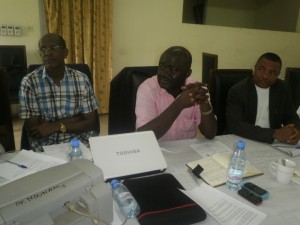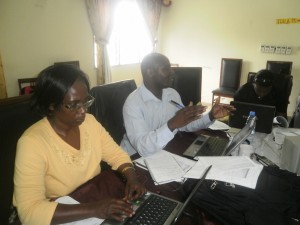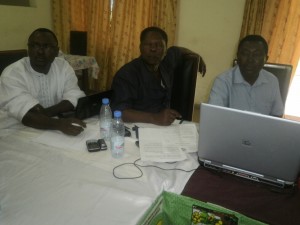By Walter Wilson Nana
African researchers interested in the beans plant and involved in the beans value chain are looking out for new ways to entrench its sustainability across the continent.
Under the purview of the Pan Africa Bean Research Alliance, PABRA, more than twenty researchers, from across Africa, with background in Tropical Agriculture, gathered at the Institute of Agricultural Research for development, IRAD, in Ekona, Southwest Region of Cameroon to examine how the beans plant can address food security, poverty and significantly contribute in the income of farmers and the national economy.

Cordinator, Dr Mathew Abang (M) and IRAD Ekona Director, Dr Etchu (R) at the African Researchers meeting in Ekona
According to the PABRA Coordinator, Dr. Mathew Abang, the successes recorded by the Cameroon National Bean Programme, with the release of seven new varieties of the bean plant, is a motivation of their meeting and should be replicated in other parts of the continent. Some of the new beans varieties he enumerated are; Mex 142 (navy bean variety), Mac 33 and Mac 55 (climbing varieties). “These beans varieties are high yield, marketable for the international scene, preferred by farmers than the other traditional varieties and other beneficiaries,” he noted.
Abang said the International Centre for Tropical Agriculture, CIAT, a partner to PABRA are warm about ensuring the sustainability of the aforementioned bean varieties. “This can be achieved if we plan, bring in the necessary technological knowhow and budget for the activities surrounding the beans plant. Beans have the ability to fix atmospheric nitrogen and in the process, improve on soil fertility,” he mentioned.
The PABRA Coordinator said if Cameroon can make beans a foreign currency earner, then other African countries can emulate the example.
He enjoined the Cameroon National Bean Programme Coordinator to reach the PABRA target of one million beans farmers and other stakeholders in the bean value chain in the nearest future. “We’re well on track to achieve that. I have no doubts. We will contribute in strengthening the various research centres in Cameroon and other parts of Africa, including the researchers, so that they implement their activities,” he said.
Dr. Laurent Nounamo, Cameroon National Bean Programme Coordinator said researchers from Cameroon and other parts of Africa have resolved to come out with a blueprint for bean seed production in Cameroon, following ready funding from PABRA. “The bean plant is very nutritive, rich in protein, zinc, iron, calcium and proven to prevent prostate cancer and kwashiorkor. So, it is relevant that people eat beans,” Nounamo advised.
Though the farmers who do they everyday planting of the beans seeds were absent in the researchers get-together, Nounamo said they are working on a daily basis with the farmers. “Before this meeting, we’ve had informed knowledge from the farmers. The varieties are developed in a participatory approach, especially when we are doing the breeding in the farms. We bring together stakeholders before we select in the farms. The case of Bafoussam comes to mind, where we selected the seven new varieties. They were based on the farmers’ preferences, with about forty farmer groups involved,” he explained.
Nounamo entreated African farmers to settle for the bean plant, for there is a national and international market for it. “IRAD institutions in Cameroon are available for improved seeds,” he said.
Dr. Kingsley Etchu, Director of IRAD, Ekona said his centre is there to add value to the research carried out on an annual crop like bean. “On the ground, we’ve experienced researchers, the quality of research carried out before and the way we plan and execute our activities. We are alive in the domain of research,” he added.
Dr. Etchu said in the sidelines of the FAO and WHO prescriptions for protein to be gotten from animal sources, it is advisable to augment with the plant sources like the beans plant and other varieties.
The African researchers also talked about their challenges, opportunities and recommendations vis-à-vis PABRA.
PABRA, with headquarter in Kampala, Uganda and CIAT, are members of the Consultative Group on International Agricultural Research.





